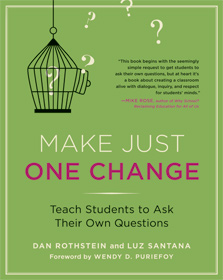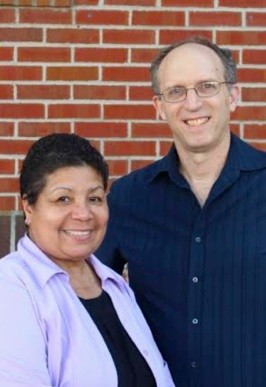Sheila teaches adult education at the county jail in Wilmington Indiana. Her courses are the only education inmates get while they’re in jail; she teaches them to read, prepares them for the GED, overall college readiness and life skills.
Sheila was trained to teach adult education using traditional methods, focusing on independent study, testing, drilling. After teaching for a few years, she realized, “That model didn’t work in public schools and it is not going to work now.” She was ready for something different, and The Right Question Project Educational Strategy (The RQP Strategy) seemed interesting and simple enough to try out.
The first time Sheila tried it she was overwhelmed by her results. “I love teaching it. It was probably the highlight of my week when I did it.” Her students also had an immediate positive reaction and told Sheila “…they learned more in that one day than they’ve learned in weeks.” They explained that they were so excited they, “…wanted to do RQP every Friday!”
Student Changes: From Academic Skills to Civic Engagement
Sheila found multiple applications for the process; academic, personal and civic. In terms of GED (High School equivalency) preparation, she reflected, “ It helps them think things through and do more problem solving. It (The GED) is about, ‘what do I know, what do I need, how do I get that information?’”
As they learned the difference between open and close ended questions, students realized their attorneys ask lots of closed ended questions, “So we talked about …how much more information you can get with your open ended questions and how you get the answers you want by closing a question…”
Perhaps the biggest change Sheila noticed was a change in attitudes towards voting. Before trying out the Right Question Project Voter Engagement Strategy, Sheila noted, “…my jail students don’t care … and don’t know why they should vote.” After this brief workshop, she found that, “everybody who was allowed to be registered did it…I probably got twenty people to vote that never voted in their lives… “ Her students told her, “I never thought voting was important but you really showed me how important it was…now I’m so excited to vote.”
Professional Development: A Tool for Educators of All Ages
Overall, Sheila was amazed by how much more inquisitive her students had become, “They seem more interested in learning and they ask much and better questions than they used to. They are having more discussions and are more interested in what’s happening in the world.” Because of her own success, she brought the RQP Strategy to a teachers meeting. In only half an hour, she walked the other teachers through the process, and showed the questions her students had come up with. She explained that they were “wowed!” Sheila believes the Strategy is an excellent tool, “…not only for adult education,… but for seniors and for civic government teachers to do in public school. It will even be good to do with younger children so they learn … to ask the questions younger and don’t wait until they are adults to learn to ask the questions.”
Thanks to Natasha Freidus of Creative Narrations for interviewing Sheila and providing this report.



